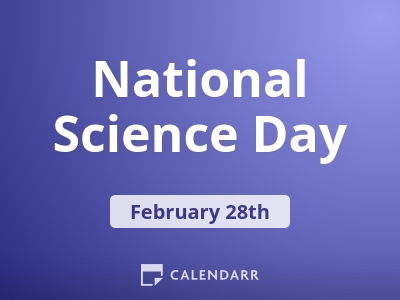- Calendar
- Calendar 2026
- February
- National Science Day
National Science Day
National Science Day is observed every year on 28th February in India to honor the extraordinary and groundbreaking discovery by Sir C.V. Raman on this date in 1928 which is the Raman Effect.
The Indian physicist explained how light changes and works when the light rays pass through different materials, and this discovery helped him get the Nobel Prize in Physics in 1930.
National Science Day highlights the importance of science in our everyday lives and promotes awareness and innovation. It aims to foster a love for science among the public, showing how science improves our daily lives.
Every year, National Science Day is observed with a powerful theme. The theme for 2025 is Fostering public trust in science
This day also affirms the role of science and technology in helping humanity and encourages young people to consider careers in science and research.
By discussing scientific achievements and current issues, National Science Day motivates people to explore new technologies that can drive the country's development. It also provides a chance to showcase India's progress and innovations in science.
Background of National Science Day
The concept of National Science Day was proposed by the National Council for Science and Technology Communication or NCSTC in 1986. Upon the acceptance of the proposal by the Government of India, National Science Day has been observed on 28th February ever since.
Although the discovery of the Raman Effect led to the founding of this day, National Science Day acknowledges and celebrates the advancements made in science and technology throughout the country.
The NCSTC also launched the National Science Popularization Awards to honor organizations and individuals who contributed significantly to science and helped in promoting scientific literacy.
The Raman Effect
The Raman effect is a change in the wavelength of light when it interacts with molecules. Most light scatters without change, but a small fraction shifts to different wavelengths due to energy being exchanged between the light photons and the molecules. This phenomenon helps study molecular structures by analyzing these wavelength shifts, which correspond to the molecule's vibrational and rotational energy changes. Named after Indian physicist C.V. Raman, this discovery is widely used in material analysis, although the effect is very weak and easier to observe in liquids and solids than in gases.
How to observe National Science Day
There are many activities that are involved in the celebration of National Science Day with the aim of spreading awareness and engaging more people in scientific discussions.
School, colleges, and other educational institutions organize debates, quizzes, science fairs, and lectures on current scientific topics
Government bodies and other scientific institutions also hosts public exhibitions to demonstrate the latest scientific finds and innovations.

Other Celebrations
-
Jan 25 Sun
-
May 11 Mon
-
Jul 01 Wed
-
Aug 02 Sun
-
Sep 26 Sat
-
Nov 10 TueWorld Science Day for Peace and Development

National Science Day - Next years
Sunday, 28 February 2027
Monday, 28 February 2028
Wednesday, 28 February 2029











